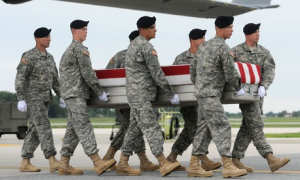U.S. Military Suicides Outnumbered Combat Deaths in Afghanistan in 2012
 (photo: AP)
(photo: AP)
The bigger struggle facing the U.S. military isn’t how to “win” in Afghanistan, but how to get the troops home and keep them alive.
Last year, more military personnel committed suicide (349) than the total of soldiers killed in the war (295).
The suicide total was the highest ever recorded since the Department of Defense began keeping track in 2001. The new mark shattered the previous high of 301, set in 2011.
The suicides among Iraq and Afghanistan war veterans may be attributed to depression, post-traumatic stress or substance abuse, according to David Rudd, a military suicide researcher and dean of the College of Social and Behavioral Sciences at the University of Utah. Suicidal military personnel who have not seen battle may face personal problems relating to financial, legal or relationship problems, Rudd told The Associated Press (AP).
Kim Ruocco, director of a suicide prevention program for the support group, Tragedy Assistance Program for Survivors (TAPS), told AP: "Now that we're decreasing our troops and they're coming back home, that's when they're really in the danger zone, when they're transitioning back to their families, back to their communities and really finding a sense of purpose for themselves.”
The U.S. Army had the highest number of suicides among active-duty troops in 2012 (182). But the largest percentage increase in suicides belonged to the Marine Corps, which saw its numbers increase by 50% from the prior year. A total of 48 Marines took their own lives.
The Air Force recorded 59 suicides, up 16% from 2011, and the Navy had 60, up 15%.
“Stress, guns and alcohol constitute a dangerous mixture,” retired Army generals Peter W. Chiarelli and Dennis J. Reimer told The Washington Post. “In the wrong proportions, they tend to blow out the lamp of the mind and cause irrational acts."
-Noel Brinkerhoff, Danny Biederman
To Learn More:
2012 Military Suicides Hit a Record High of 349 (by Robert Burns, Associated Press)
Army and Navy Set Suicide Records (by Noel Brinkerhoff, AllGov)
U.S. Military Still Considers Attempted Suicide a Crime (by Noel Brinkerhoff, AllGov)
- Top Stories
- Unusual News
- Where is the Money Going?
- Controversies
- U.S. and the World
- Appointments and Resignations
- Latest News
- Trump Orders ICE and Border Patrol to Kill More Protestors
- Trump Renames National Football League National Trump League
- Trump to Stop Deportations If…
- Trump Denounces World Series
- What If China Invaded the United States?






Comments